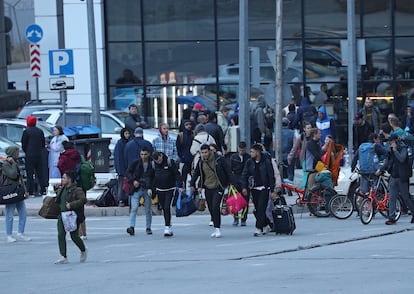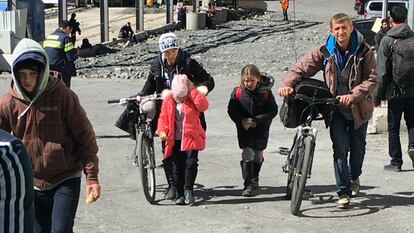Fear of border closure drives growing flow of Russians to Georgia
Entire families are crossing into the neighboring country in cars, on foot and on bicycles to avoid the draft following Putin’s call to mobilize more troops to Ukraine

With a backpack on his back and another one on his chest, Andrei, a 36-year-old Russian who worked in the construction sector until last week, was on Monday struggling to climb the steep slope near the border between Russia and Georgia, close to the village of Stepantsminda, population 2,000. Andrei, who had been on the road for over three days, was not alone: with him were his wife Anna, a 36-year-old teacher, their 12-year-old son on another bike, and their two daughters ages six and nine. “You can take a picture of us if you like,” said Andrei. “That way the world will realize what situation we Russians are going through right now.”
Andrei, like tens of thousands of Russians these days, is trying to escape the draft that authorities announced last Wednesday to send more fighters to the frontlines in Ukraine. The flow of people to Georgia has accelerated, according to residents of the area, partly driven by fear of a border closure by Moscow or Tbilisi.
The couple took barely half-an-hour to decide to flee their country after the mobilization was announced last week. “I asked God for a sign. And immediately I saw an advertisement on the phone where it said: ‘Take advantage of the opportunity.’” They did not hesitate to make the trip with their children. “In Russia there are some very good people”, said Andrei. “When taxi drivers saw us with the bicycles and the children, they took us in their cars for free.”
Asked what they were planning to do about schooling their children in Georgia, the couple shrugged. Their most pressing need was to get away from the border and to the capital, Tbilisi, a four-hour drive away. Taxi rides that cost the equivalent of €50 on Sunday had gone up to €60 on Monday. The influx of Russians was already bringing prices up.
Vladimir Putin’s speech last Wednesday, in which he announced a “partial mobilization” of the civilian population to fight in Ukraine, has triggered an exodus of people who do not wish to be part of what the Russian leader refuses to call a war. Following the announcement, hundreds of men began arriving in Georgia, many of them friends traveling in groups. On Sunday, some also began to arrive in the company of their spouses. By Monday, as confirmed by all the residents consulted in Stepantsminda, the Georgian town closest to the Russian border, more Russians had arrived than any previous day, including dozens of families with children.
Anastasia, 36, was carrying an 11-month-old baby in her arms. She crossed the border on Monday with her husband, Alexander, 38, and with their five-year-old son. “For now, schooling is not a problem,” she said. “In our country it is compulsory from the age of six.”
Another woman with two children ages two and five would not openly admit that she and her husband were fleeing the forced mobilization, which Moscow said would affect 300,000 people. And another woman with a child in a baby stroller did not want to talk, either - in fact all interviewees declined to use their real names for for fear of reprisals. But her friend confided that “we all come from St. Petersburg and our goal is to get to Turkey.”

Rasti, 31, is a musician who traveled to the Georgian border with his wife, Alisa, 29, covering the last 30 kilometers on foot while dragging two medium-sized suitcases behind them. “It is very likely that Putin will close the borders one of these days. That is why people between 18 and 55 years old [of military service age], are in a hurry to come to Georgia,” he said.
Several Georgian journalists reported that Russian authorities have sent troops to the hills bordering Georgia to prevent Russians from crossing over without going through the official border checkpoints. “Crossing the mountains is free for the Russians, they don’t have to pay any bribes at the border. And the Georgian government does not want to send its soldiers to the mountains,” wrote a Georgian reporter.
Rasti believes that the closure of the borders is imminent and warns that Russians between the ages of 18 and 55 have only two options: go to war or go to jail. “And since Russian prisons are terrible, they are really only giving us a choice between dying on the front lines or in a prison cell.” The musician believes that the initiative of countries like Germany, which said it would offer visas to Russians who want to avoid war, “is very good.” “The fewer soldiers the Russian Army has, the weaker it will be.”
Meanwhile, in the town of Stepantsminda, some local residents are cashing in on the situation. Salomé, who owns a grocery store, said that she had never seen so many Russians walk in as they did on Monday. “I have run out of bread, milk and eggs. They also often buy vodka, beer and tobacco.” Over at a restaurant named Kazbegya, there weren’t enough waiters to deal with so many customers. “Around 99.9% of them are Russian,” said Nika, a 19-year-old who waits tables. “Many are nice, although some treat you with an air of superiority.” Nina, a hotel owner, explained that “this town has never had any problems with the Russians. But they have to keep in mind that now they are guests in this country.”
Lali, a 70-year-old saleswoman at a shop selling typical Georgian products, noted that many of the Russians showing up in town are poor: “For me, politics is one thing and the people are another. And these people need us to give them a good welcome. My sister has a hotel in town. Some of the 20-year-old Russians who arrive there are surprised at her warm welcome. But that’s how we have to treat them.”
It is unclear how long Georgia, a country of 3.7 million inhabitants, will be able to sustain the daily arrival of hundreds and even thousands of Russians. For now at least, those who arrive come with enough money that they can afford getting scammed by the taxi mafia as soon as they cross the border. Most of the Georgian taxi drivers consulted by this newspaper did not want to talk about the Russians.
Rumors from the border
There are also many Russians who have managed to cross into Georgia in their cars, after two-day waits at the border. That has been the case for Andrei, 25, and his wife, Nina, also 25. “People were getting very nervous in the lines,” explained Nina. “There were rumors that Georgia would close the border at any moment. And there was a caravan of cars tens of kilometers long and there were some who wanted to advance at all costs. People stuck their cars just 10 centimeters from the next one, so that no other car would cut in.”
“Russian policemen,” said Andrei, “said to some of us, while looking at our passports: ‘You have been mobilized to go to Ukraine! I’m going to hand you over right now.’ Then they added: ‘Just kidding, man, it’s a joke. Go right ahead.’”
Andrei thinks that, for the moment, he will not be drafted. “But it is very likely that they will call me in the next few months. So I didn’t want to risk it. Georgia is the land of my grandparents, I have never been here and we are going to try to spend a few months in this country.” Nina said that the decision was not easy at all: “We have two dogs and we had to leave them in Moscow, one with my mother and the other with my mother-in-law.”
Asked why so many people are traveling to Georgia from Moscow, when perhaps there are poorer Russian regions where more people are being recruited, this woman said that men were also being called up in the Russian capital. “The father of a 25-year-old friend of mine has been called. The father is 47 and the mother does not have a job. The situation is difficult for that family.”
"And what has the father done?"
“He’s trying to hide, like everyone else,” said Nina.
Tu suscripción se está usando en otro dispositivo
¿Quieres añadir otro usuario a tu suscripción?
Si continúas leyendo en este dispositivo, no se podrá leer en el otro.
FlechaTu suscripción se está usando en otro dispositivo y solo puedes acceder a EL PAÍS desde un dispositivo a la vez.
Si quieres compartir tu cuenta, cambia tu suscripción a la modalidad Premium, así podrás añadir otro usuario. Cada uno accederá con su propia cuenta de email, lo que os permitirá personalizar vuestra experiencia en EL PAÍS.
¿Tienes una suscripción de empresa? Accede aquí para contratar más cuentas.
En el caso de no saber quién está usando tu cuenta, te recomendamos cambiar tu contraseña aquí.
Si decides continuar compartiendo tu cuenta, este mensaje se mostrará en tu dispositivo y en el de la otra persona que está usando tu cuenta de forma indefinida, afectando a tu experiencia de lectura. Puedes consultar aquí los términos y condiciones de la suscripción digital.








































